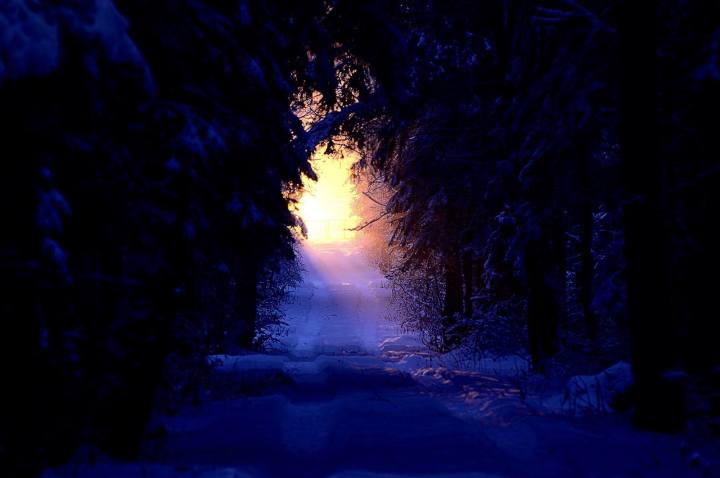Our God is a romantic—truly, a hopeless romantic.
We know this by creation: sea creatures that glow electric blue when touched by night, Everest rising ragged above all else, a sky awash with a thunderhead as if with ink. Or consider blue-green waves hushing against a red beach, trees suffocated by ivy, horses tearing over Scotland’s heath, a peacock flaunting its iridescent finery. Wildflowers, a brook in the woods, a wet-black calf emerging into a world of straw and light and its mother’s lowing. One could gush on and on, because creation is utterly romantic—because its Maker is utterly romantic. It is His love-note to us. He is a Lover who knows how to swoon His beloveds, does He not? I know my own heart squeezes when I look upon creation—in the same way that my heart squeezes when my gaze connects with the one who has captured my heart.
And so we must conclude that human romance was created to reflect our divine romance with God. Why else do we exist but because God’s love swelled to overflowing? Love begets love. Yes, His love overflows into us, and that same love overflows into each other. Romance is why we are. We were created to live romantic lives.
But how does this unfold?
In The Screwtape Letters, C.S. Lewis wrote: The good of oneself is to be the good of another.
And this is love.
Such hope dwells within that insight—fullness of life for you and fullness of life for another, not apart from each other, but precisely because your lives are intertwined. For if the Lord has designed you to be the good of another, you are not only liberated but called to become fully you. Every bit that constitutes you—your humor, intellect, likes, dislikes, dreams, even your fears and flaws—every bit is to lead the other to greater holiness. Just as they were designed for your good. Indeed, in a divinely inspired union, when you give yourself and love another, you will receive your beloved’s self and their love. And by receiving them, you are also liberating them to become fully themself and thereby bringing them joy.
But perhaps the most liberating, the most joyous thing, is that by the sheer nature of your union, those fears and flaws in you, in the other, will be ground to dust beneath your feet as you journey toward Heaven, hand in hand. For love liberates you to be the best version of yourself.
It is a selfless calling, as you give your whole being to another, even as it is ultimately fulfilling. It is a calling that finds its origin deeper than your emotions, deeper than the other’s emotions, because whether or not you feel like giving, or feel the other’s need for you, they do still need you. You were designed to help transform each other into saints. Thus, even when your emotional love, or the other’s, lapses (as it will for we are weak), hope remains. For emotions were merely designed to stir spark into flame, to fuel your essential drive to give—which is to love always, no matter what.
But the essential is not dependent on the emotional. No, the essential is dependent only on Love Himself, on keeping your eyes ever fixed on who your beloved truly is, which is the image of Christ. No matter how tarnished the image may become, what lies beneath remains intrinsically beautiful. Christ, who is Truth, never changes, thus who the other person truly is never changes either. Your love for them, then, never need be threatened, even when it seems the fire has died and all that remains is ash. Believe that an ember yet glows, hidden but waiting to blaze again.
For the Lord desires that your love burn—because it is within the union of two lovers that His own love burns the brightest in all the universe.
Knowing this, I believe it is okay to be swept off your feet, to let the fireworks erupt—as long as your emotions draw you deeper into the heart of your beloved, where you will come face-to-face with that image of the Great Romantic. May newborn enchantment, then, give birth to true passion—that is, the passion that drove Christ to lay down His life for His bride, the Church. Just so, we must deny ourselves, pick up our crosses, and lay down our lives for the those we love. Only once we have died can there be resurrection. That is romance.
That is love.











